This article dives into navigating the costs of autism testing for adults. It’s important to recognize that expenses can vary significantly based on factors like the type of assessment, the qualifications of the evaluator, and where you live. Understanding these costs—and the financial assistance options available—can truly empower you to make informed decisions about your assessments and access the support services you need.
Let’s explore this together! By knowing what to expect, you can feel more confident in your choices. Remember, you’re not alone in this journey; many others are navigating similar challenges. If you have any questions or experiences to share, we’d love to hear from you!
In the journey to understand autism, evaluating adults is a vital step toward self-discovery and empowerment. This assessment dives into an individual's behavior, communication, and social interactions, painting a complete picture of their unique strengths and challenges. As more people become aware of autism, many adults are seeking evaluations to clarify their experiences. This leads to better self-advocacy and access to personalized support services.
However, navigating the complexities of autism testing can feel overwhelming, especially when considering the costs and available financial assistance. By exploring the evaluation process, individuals can prepare for this transformative journey. Ultimately, this journey can unlock the potential for a better quality of life and meaningful connections. Let’s explore this together!
Autism testing for adults is a multifaceted assessment process that takes a close look at behavior, communication, and social interaction. This comprehensive approach typically includes a mix of interviews, questionnaires, and standardized tests, all conducted by qualified professionals. Each part plays a vital role in painting a complete picture of an individual's unique challenges and strengths.
Understanding the different aspects of assessment for individuals on the spectrum is crucial for adults who are curious about autism testing costs. For instance, interviews help clinicians gather detailed personal histories and insights into daily functioning, while questionnaires provide standardized measures of behavior and social skills. Standardized assessments also assist in measuring specific characteristics linked to autism spectrum disorder (ASD).
Recent statistics show that many adults undergoing autism testing find a clearer understanding of their challenges after evaluation. This newfound clarity can lead to better self-advocacy and access to tailored support services. Moreover, specialist insights emphasize the importance of a thorough assessment process, which not only aids in diagnosis but also guides effective intervention strategies.
Current best practices in assessing adults with developmental disorders advocate for a holistic approach that considers the individual's life context, including their social and cultural background. This is especially relevant given the observed disparities in diagnosis rates among different racial and ethnic groups. For example, a recent case study titled "Racial and Ethnic Disparities in Autism Diagnosis" pointed out that while diagnosis rates have improved for children, adults—particularly those from historically underserved communities—still face significant barriers to receiving timely and accurate diagnoses.
As of 2020, the percentage of 8-year-old Asian or Pacific Islander, Hispanic, and Black children identified with ASD surpassed that of White children, indicating improved screening and access to services for these groups.
In summary, knowing how much autism testing costs for adults is essential for identifying needs and accessing appropriate resources. By understanding the components and significance of this process, individuals can better navigate their journey toward personal development and support. At Rori Care – ABA Therapy, we’re dedicated to ensuring every child has the chance to thrive and every family has the necessary resources, highlighting the importance of equitable healthcare access in the assessment process.
Additionally, families can take advantage of free consultations with Rori Care's Board Certified Behavior Analyst, who can offer guidance on enhancing social skills and confidence for individuals with Autism, ADHD, Social Communication Disorders, Anxiety Disorders, and others looking to boost their social competence. Let’s explore this together!
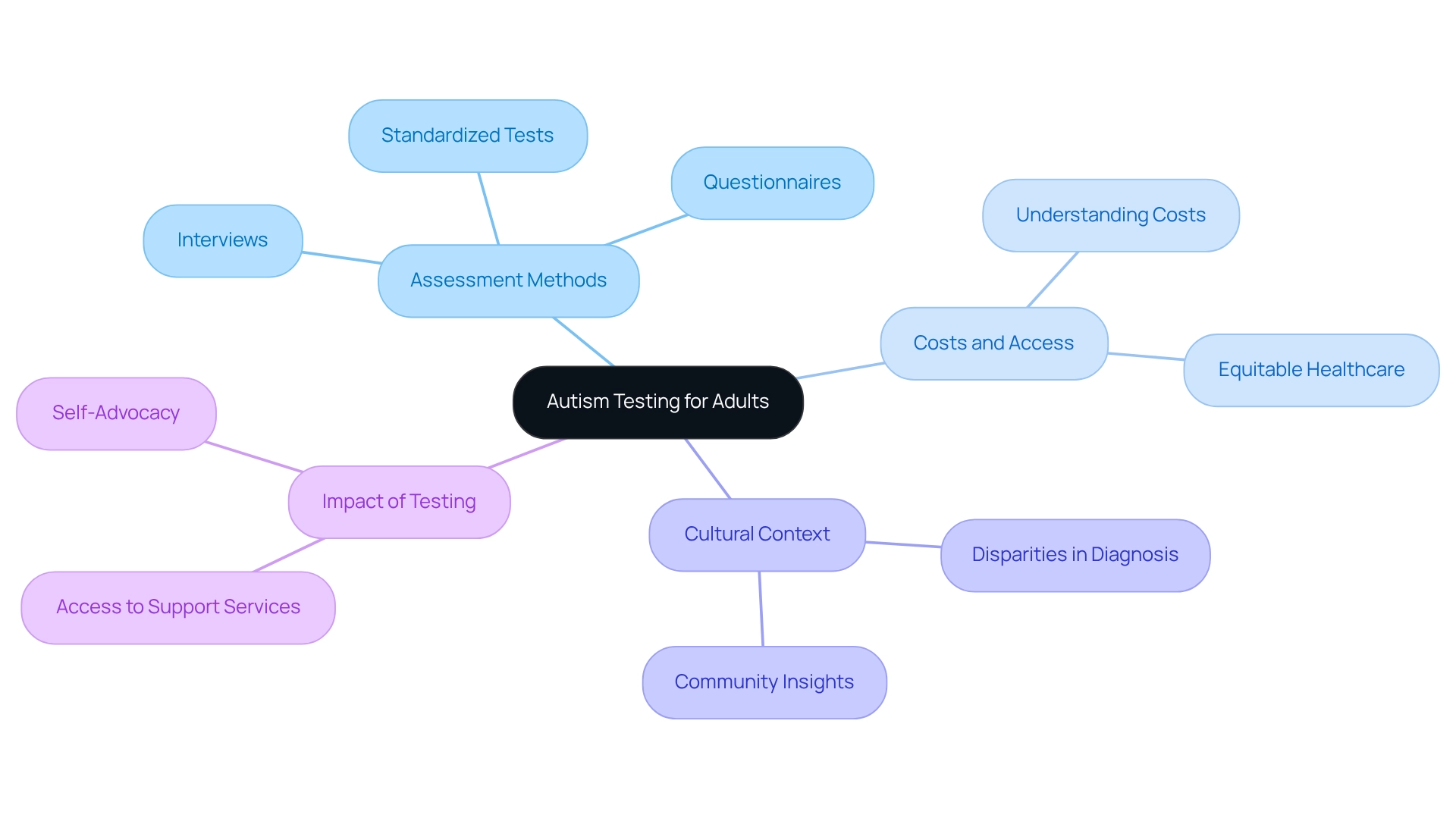
For many adults, undergoing a neurodevelopmental assessment can be a transformative step toward understanding their unique challenges and strengths. A formal diagnosis not only validates their experiences but also helps them make sense of past difficulties in social interactions, communication, and behavior. Research shows that a significant percentage of adults feel validated after receiving a diagnosis, which can be crucial for their emotional well-being.
Additionally, acquiring a diagnosis can open doors to vital assistance services, workplace accommodations, and community resources tailored to their needs. This is especially important as many adults may have long believed they are on the spectrum but have hesitated to seek formal evaluation due to various obstacles, like concerns about the cost of autism testing for adults and stigma. Interestingly, more than half of professionals’ knowledge about services for adults comes from their current job at a city or regional level, highlighting the importance of local resources in navigating these challenges.
At Rori Care, we offer a variety of mental health assistance services, including:
Each service is customized to support households with autism, helping them overcome challenges and fostering child development through expertise and compassion. For example, Group Therapy provides a nurturing setting for individuals to share experiences and gain insights from one another, while Caregiver Education equips families with the resources they need to support their loved ones effectively.
Program Development focuses on creating personalized strategies that cater to each individual’s unique needs, and Supervision ensures that families receive ongoing guidance and support. Individual Therapy offers a safe space for personal exploration and coping strategy development.
Case studies indicate that individuals who have undergone autism assessments often experience substantial improvements in their quality of life. For instance, many report enhanced self-awareness and better coping strategies, leading to more fulfilling personal and professional relationships. One respondent shared, "you might say I'm not friendly/sociable," illustrating the personal impact of these evaluations.
However, the disconnect between the services reported by professionals and the experiences of autistic adults is concerning. A survey by the Autism Spectrum Disorder in the European Union (ASDEU) network found that a significant number of autistic adults and caregivers indicated they did not receive any suggested post-diagnostic assistance, despite expressing a need for it. This highlights the necessity for more accessible and effective post-diagnostic support.
In summary, recognizing the importance of evaluations for adults with developmental disorders is vital. These assessments not only provide clarity and validation but also pave the way for meaningful support and resources, like those offered by Rori Care, that can significantly impact their lives. Let’s explore this together!
The cost of autism testing for adults can really vary, and there are several key factors at play. One of the biggest influences is the type of assessment you choose. Comprehensive assessments, which dive deep into an individual's cognitive, emotional, and behavioral functioning, usually come with a higher price tag compared to simpler screening tools.
Another important factor is the qualifications and experience of the evaluator. Seasoned professionals with specialized training may charge more, reflecting their expertise and the quality of service they provide.
Don’t forget about geographic location! Testing centers in urban areas often face higher operational costs, which can lead to increased charges for assessments. Plus, the complexity of the assessment process can also impact the total costs.
Many assessments require multiple sessions and various tools, which can add up. For instance, real-world examples highlight these variations. A study titled "Socioeconomic Status and ASD Financial Burden" found that socioeconomic status (SES) significantly affects healthcare costs. Families with higher SES often incur greater out-of-pocket expenses for autism-related services, showing how financial strain can differ widely based on economic factors.
This is especially relevant considering that the average life expectancy in the U.S. was 78.7 years in 2018, which underscores the long-term implications of diagnosis and care.
Expert opinions also stress the importance of understanding these cost dynamics. MB, the CFO of the Holland Center, suggests that individuals seeking assessments should ask about what specific elements are included in the analysis. This can really help clarify pricing structures! Typically, a breakdown of costs reveals that initial consultations, diagnostic testing, and follow-up sessions each contribute to the overall financial commitment.
Statistics show that the typical expenses for assessments related to developmental disorders in adults can range from several hundred to several thousand dollars, depending on those earlier mentioned factors. By being aware of these elements, individuals can better prepare for the financial aspects of their assessment journey. However, it’s essential to note that there are limitations in studying cost components, such as variations in costs and the exclusion of grey literature and non-English articles.
Moreover, the CDC prevalence estimates from 2020 highlight the growing need for testing, further emphasizing the financial implications tied to these assessments. Let’s explore this together!
In 2025, the cost of autism testing for adults typically ranges from $1,000 to $3,000. However, some assessments can be found for as low as $485! This raises an important question: how much does autism testing cost for adults, especially through specific programs or clinics that aim to make these services more accessible? On the other end of the spectrum, thorough assessments may surpass $5,000, depending on the provider and the depth of the analysis required.
Given this wide range of costs, it’s crucial for individuals seeking an evaluation to do their homework. Comparing prices across various providers can help identify a service that fits their financial situation while ensuring they receive quality care tailored to their needs. As one specialist wisely noted, "If individuals seek practical assistance, they should inquire with the provider in advance about what type of aid they provide."
Alongside understanding expenses, households can benefit from caregiver education programs offered by Rori Care. These programs empower caregivers with knowledge and skills to enhance their child's development effectively. This education not only fosters informed decision-making but also improves behavioral outcomes, creating a more supportive home environment. Plus, it equips caregivers to complement professional interventions, promoting consistency in applying strategies at home.
For instance, the United Healthcare Children's Foundation (UHCCF) provides grants to help families with medical needs not covered by insurance. This can ease some financial pressures related to testing for developmental disorders. Real-life budgeting examples can also show how families have managed these costs, highlighting the importance of planning and seeking financial assistance when needed. A case study on using visual schedules for children with developmental disorders demonstrates how practical strategies can help families tackle challenges effectively.
Expert commentary emphasizes that understanding how much autism testing costs for adults is key to making informed decisions about evaluations related to developmental disorders. By being proactive and asking providers about the specific assistance they offer, individuals can better navigate the financial implications of autism testing and ensure they invest in the right resources for their needs. This aligns perfectly with the mission of Rori Care – ABA Therapy, which is to ensure every child can thrive and every family has the tools to make informed choices, including access to free consultations with our Board Certified Behavior Analyst.
After receiving a diagnosis, families are encouraged to reach out to Rori Care for guidance on the next steps. We’re here to help you every step of the way, ensuring you have the support needed during this critical time.
Many health insurance plans offer coverage for evaluations related to developmental disorders, but the extent of this coverage can vary widely based on the provider and specific policy. As we look ahead to 2025, it’s crucial for individuals seeking a diagnosis to thoroughly review their insurance benefits. This way, they can understand what costs are covered and identify any potential out-of-pocket expenses.
Did you know that statistics reveal Medicaid-enrolled children with Autism Spectrum Disorder (ASD) face healthcare costs that are four times higher than those with private insurance? This is largely due to the broader range of ASD-specific services that Medicaid covers. This disparity really emphasizes the need to understand the nuances of insurance coverage, especially regarding Applied Behavior Analysis (ABA) therapy, the only scientifically proven treatment for autism, which is often included in insurance plans.
Beyond insurance, many clinics offer sliding scale fees or payment plans to assist individuals without coverage. Real-life examples show that some families have successfully utilized financial aid programs to help cover the costs of assessments, easing the financial burden of obtaining a diagnosis. Experts suggest that households shouldn’t hesitate to inquire about available financial assistance options when seeking assessments, as these resources can significantly lighten the load.
Moreover, being actively involved in your child’s therapy, guided by ABA principles, can enhance the effectiveness of interventions. In fact, many studies indicate that this approach leads to significant progress in 90% of children.
It’s important to recognize that the cost of autism testing for adults without insurance can pose a significant financial barrier for many families, potentially limiting access to essential services and support. For instance, if per capita expenditures increased to $36,000 annually, the rise in household contribution would be just $6.53 a month, or $78.31 each year. By exploring all available options—insurance coverage, financial assistance, and payment plans—individuals can better navigate the costs associated with autism testing for adults and ensure they receive the necessary care.
However, let’s keep in mind the limitations of the study that highlighted these findings. It relied on outdated data from 2003 and used county-level socioeconomic variables, which might affect the relevance of the findings to current ASD care. As Steven Zauderer wisely noted, 'Overall, the cost of a developmental assessment without insurance can be a significant financial burden for many families and could be a barrier to accessing essential services and support.'
Let’s explore this together! Understanding your options can make a world of difference.
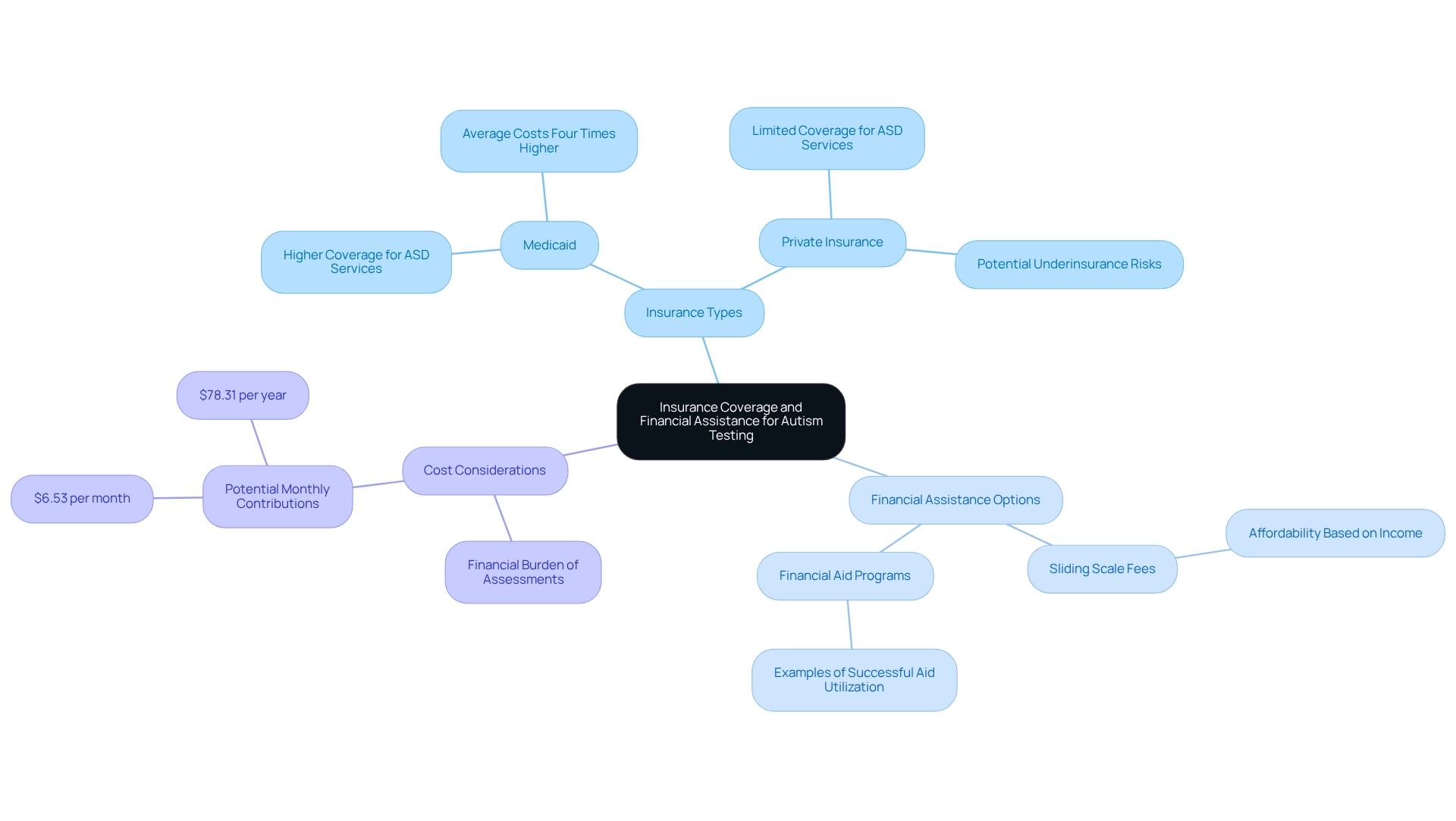
When it comes to autism testing costs for adults, it’s not just about insurance coverage. There are plenty of financial aid programs and grants available to help ease the burden. Organizations like Autism Speaks, along with local advocacy groups for developmental disorders, are fantastic resources. They provide a wealth of information on funding options for individuals looking to get a diagnosis. For example, seven states have introduced Medicaid home- and community-based services (HCBS) waivers specifically to support youth with Autism Spectrum Disorder (ASD), which can also benefit adults needing evaluations.
Additionally, there are numerous grants out there that can help answer the question of how much autism testing costs for adults. These grants can really lighten the financial load for families and individuals. Autism Speaks, for instance, has a comprehensive list of grants that can assist with assessment costs. This is crucial for ensuring that financial constraints don’t stand in the way of accessing important services.
Real-life stories highlight the positive impact of these financial assistance programs. One family shared how they utilized a state-funded program that provided essential resources for their adult child's assessment. This led to a timely diagnosis and access to tailored support services. Programs like this not only help with immediate expenses but also empower families to navigate the complexities of care, fostering independence through vital skill development.
Expert insights further emphasize the importance of early screening and diagnosis. As Laura Conrad, Senior Consultant at Technical Assistance Collaborative, Inc., points out, "One of the most important factors in improving the outcome for individuals with ASD is early screening and diagnosis." Getting evaluations done promptly can make a real difference, making the availability of financial assistance even more essential.
By exploring these opportunities, individuals and families can uncover valuable resources that make effective diagnosis and care more accessible.
At Rori Care – ABA Therapy, we’re passionate about ensuring every child has the chance to thrive. Our services focus on equipping caregivers with the knowledge and skills needed to support their child's behavioral goals, all while aligning with the financial assistance available to help families on this journey. Let’s explore this together!
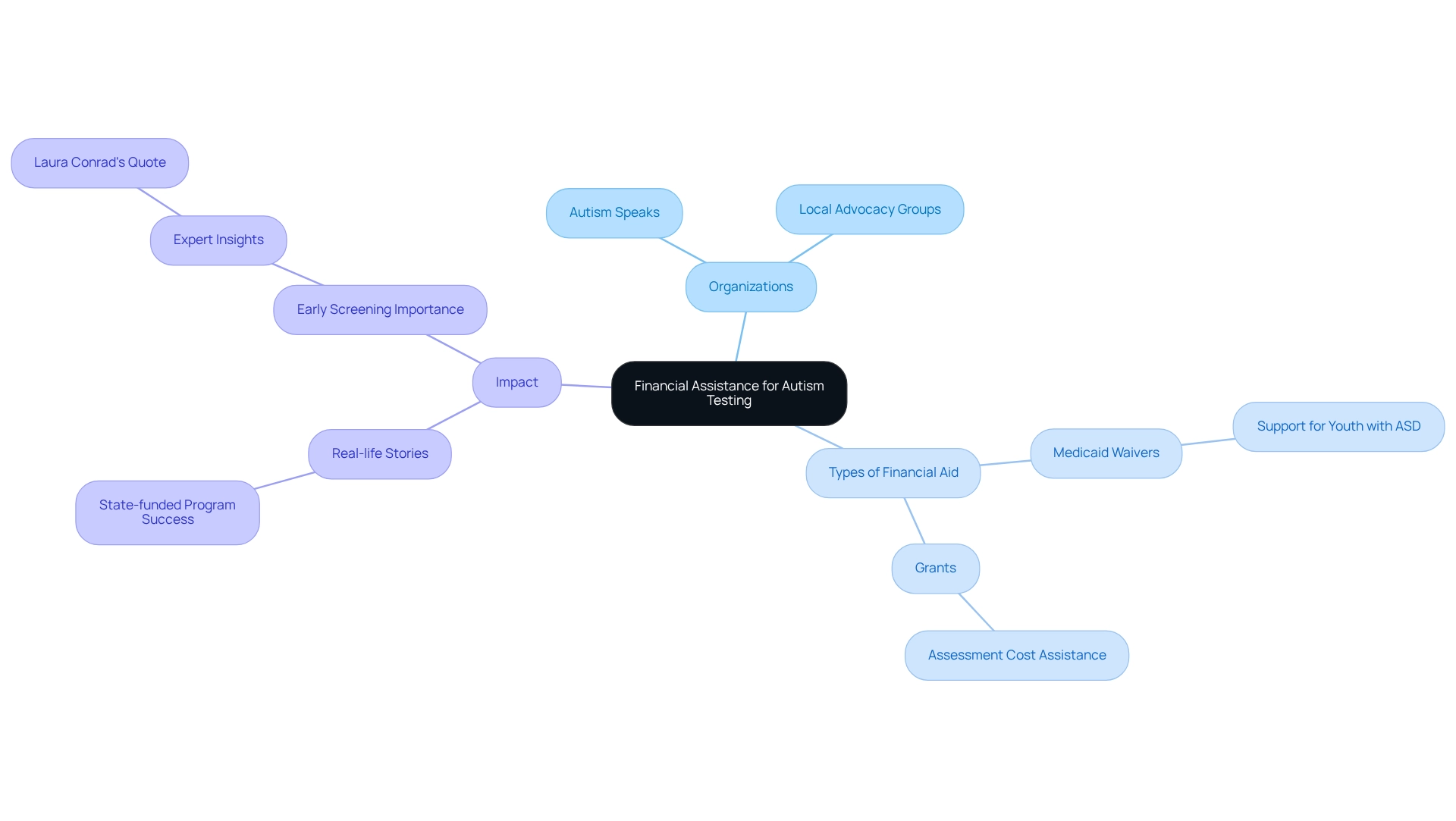
When planning for autism testing, it’s crucial to start by assessing your financial situation. This helps you understand how much autism testing costs for adults and how much you can realistically set aside for the assessment. Experts recommend saving up over a few months to cover expected expenses, which can vary significantly based on the complexity of the assessment and specific services needed. For example, the average service-related costs for supporting autistic adults can reach around £2,240 for health and social care, with societal costs averaging £2,453.
Understanding these figures can help families set realistic financial goals regarding autism testing costs.
If you have access to flexible spending accounts (FSAs) or health savings accounts (HSAs), consider utilizing them. These options can provide tax benefits that lighten the financial load. It’s also important to keep track of all costs related to the assessment process, including travel and any follow-up appointments, to stay within your budget.
Rori Care offers complimentary consultations with Board Certified Behavior Analysts, a valuable resource for families navigating the assessment process. These consultations not only guide you through the assessment journey but also help you understand your insurance coverage options, including interaction with providers and a timeline of 1-3 business days for verification. This support can significantly reduce the stress of financial planning for autism services, especially when considering how much autism testing costs for adults.
Budgeting strategies can also include consulting financial planning experts to gain insights into autism testing costs. They can share effective budgeting techniques tailored to your unique situation. For instance, some families have successfully adopted a phased strategy for financing assessments, allowing them to manage expenses more effectively over time.
This is particularly relevant given the recent expansion of ABA services, which has grown despite oversight challenges, pointing to a thriving market that families might want to consider when planning their budgets.
Real-world examples emphasize the importance of proactive financial planning. One family shared that they saved for six months before their child’s assessment, enabling them to cover not just the testing costs but also additional expenses like therapy sessions and transportation. This approach alleviated financial stress and allowed them to focus on their child’s needs without worrying about unexpected costs.
As Rep. Becky Cash noted, "I don’t know of any other medical therapy that we max out at three years... the potential devastation is so far reaching that it would be hard to even qualify." This underscores the importance of financial preparation in therapy for individuals with developmental disorders, as families navigate the complexities of funding these essential services.
In summary, managing autism testing costs for adults and other evaluations related to developmental disorders requires thoughtful financial planning, strategic budgeting, and a solid understanding of available resources. By following these steps and utilizing the support from Rori Care, families can navigate the financial aspects of developmental testing more effectively, ensuring their loved ones receive the necessary support and care. Plus, adopting an episodic approach to care plans could turn out to be a more economical strategy for families looking to manage their expenses. Let’s explore this together!
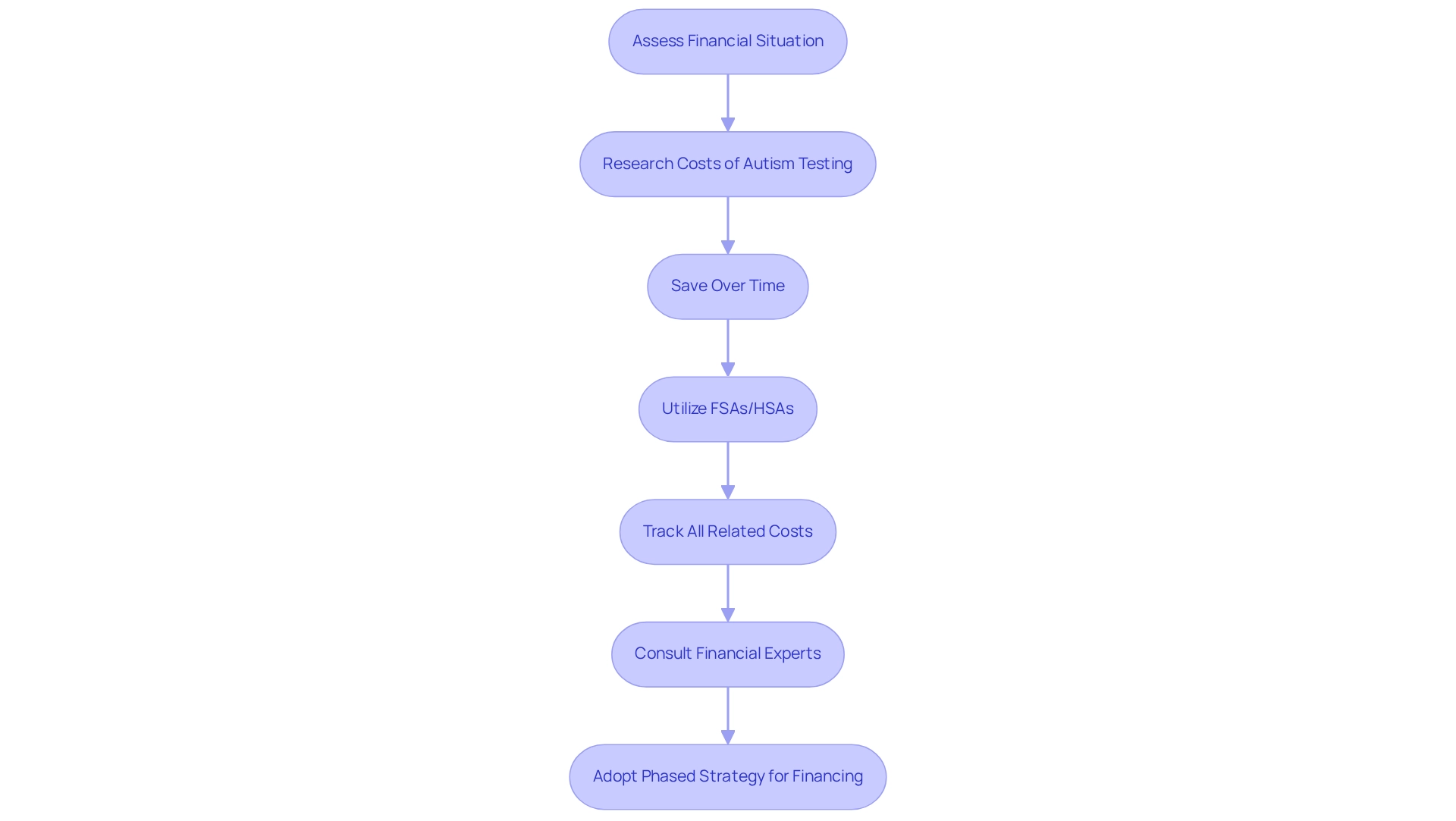
The autism evaluation process for adults is structured and involves several key steps designed to ensure a thorough understanding of the individual's needs, including inquiries about how much autism testing costs for adults. It all begins with a consultation where an evaluator gathers detailed information about the individual's history, concerns, and any observed behaviors. This foundational step is crucial, as it sets the stage for a tailored assessment approach.
Rori Care is here to assist you in navigating this journey with your child and loved ones. We offer a FREE Autism Consultation with our Board Certified Behavior Analyst, providing families with essential support during this challenging time. Following the consultation, a series of assessments are administered. These may include standardized tests, such as the Autism Diagnostic Observation Schedule (ADOS) and the Autism Diagnostic Interview-Revised (ADI-R), which have been shown to enhance diagnostic accuracy significantly.
Observational evaluations may also be part of this phase, allowing evaluators to witness behaviors in real-time, providing valuable insights into the individual's condition. The importance of accurate assessment is underscored by Mazefsky et al., who state that 'accurate assessment of behavioral and psychiatric concerns in individuals with autism allows for specific and individualized treatment planning and management of additional symptoms and, in turn, optimal treatment outcomes.' Once the assessments are completed, a feedback session is scheduled.
During this session, the evaluator discusses the results with the individual, offering clarity on the findings and suggestions for assistance or treatment. This step is essential, as it not only informs the individual about their diagnosis but also outlines potential pathways for intervention and support. Rori Care highlights the importance of early intensive behavioral intervention (EIBI) for enhancing learning, verbal, and social abilities in children with developmental disorders, which can also assist adults through customized support.
Understanding this organized approach can reduce anxiety and prepare individuals for what to anticipate during their assessment. Research indicates that early intervention, particularly in childhood, can significantly improve outcomes, underscoring the importance of knowing how much autism testing costs for adults to ensure accurate and timely assessments. Early childhood screening for developmental disorders is essential, as it can lead to significant impacts on prognosis.
By participating in a thorough evaluation process, individuals can obtain the tailored and personalized treatment planning essential for optimal results, while also understanding how much autism testing costs for adults, as emphasized by specialists in the field. Furthermore, progress in diagnostic assessment practices related to developmental disorders has moved towards evidence-based, standardized assessment tools, highlighting the importance of interdisciplinary teams in enhancing diagnostic precision. Engaging stakeholders from underrepresented communities in the creation of evaluations is essential for improving diagnosis and care, ensuring that varied viewpoints are taken into account.
Additionally, statistics indicate that developmental disabilities in children have been examined across 195 nations and regions from 1990 to 2016, emphasizing the worldwide significance of effective evaluations for this condition.
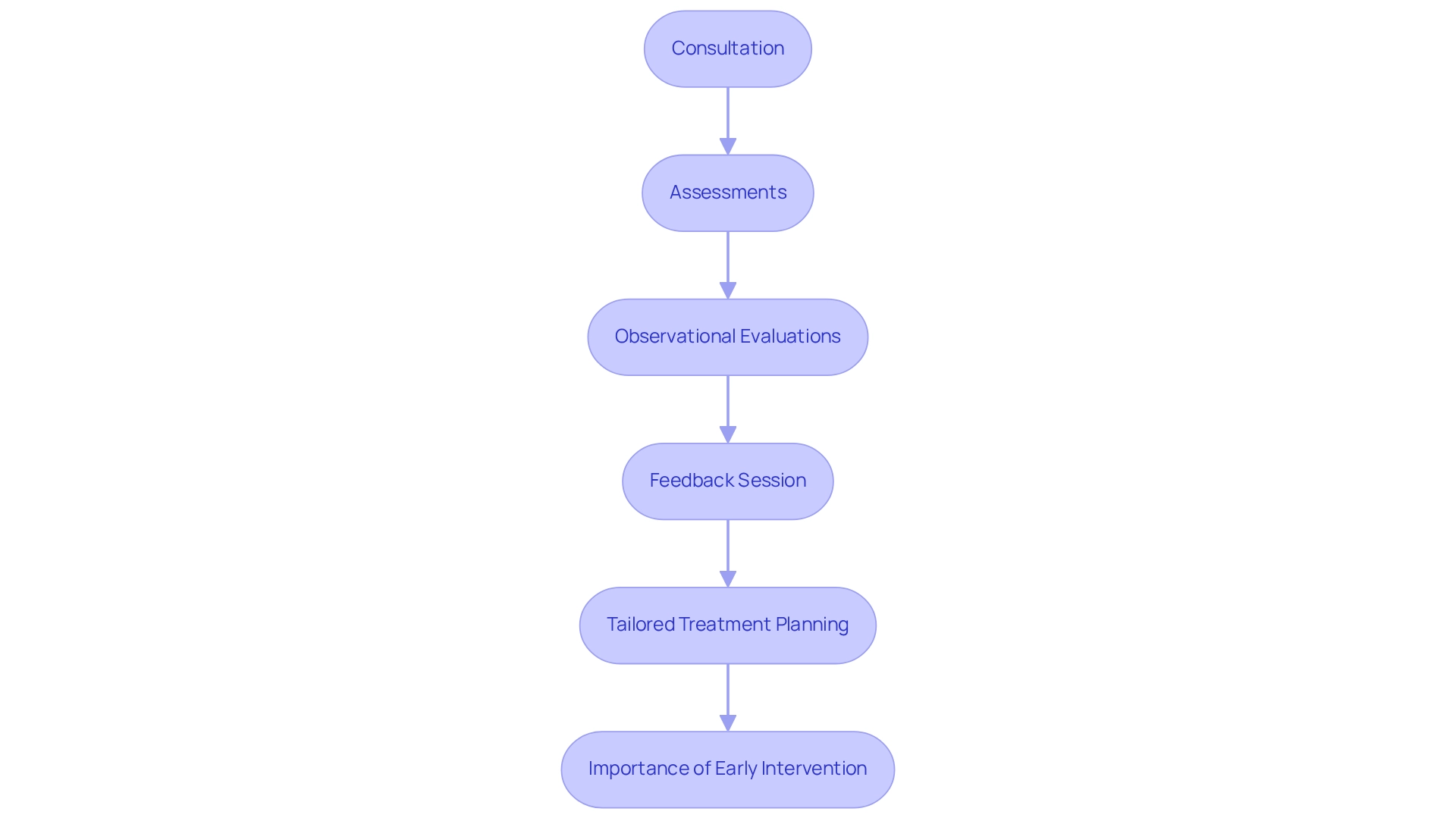
Investing in a developmental assessment can really pay off for adults in the long run! A formal diagnosis not only boosts self-awareness but also opens the door to personalized support that can significantly enhance quality of life. Did you know that diagnosis rates among adults have seen a remarkable increase? Females have experienced a 315% rise, while males have seen a 215% increase from 2011 to 2022. This shift highlights a growing awareness of neurodevelopmental disorders in adulthood and the importance of timely assessments.
Many people share a sense of relief and validation after receiving their diagnosis. This newfound understanding enables them to seek out resources and assistance tailored to their unique needs. Experts emphasize that knowing one’s condition can lead to better coping strategies and improved social interactions. This is particularly important when addressing common concerns like sexuality issues and bullying, which can complicate the lives of those with autism. As noted by Steinhausen et al., "In their 2016 systematic review, understanding the long-term outcomes for individuals with ASD is crucial for developing effective assistance strategies."
We can’t overlook the vital role of caregiver education. By equipping caregivers with knowledge and skills rooted in ABA principles—like reinforcement strategies, data collection, and behavior modification techniques—families can foster a consistent and supportive environment that maximizes the impact of interventions. Informed caregivers are better positioned to make decisions that positively influence their child's progress, leading to improved behavioral outcomes and stronger family dynamics.
The benefits of caregiver training extend beyond informed decision-making; they empower caregivers, ultimately creating a more effective support system for children with developmental disorders.
Real-world examples illustrate the transformative power of a formal diagnosis related to autism spectrum conditions. For instance, a case study titled "Family and Environmental Influences on ASD Outcomes" explored how household dynamics and environmental factors impact individuals with ASD. The findings revealed that positive family interactions and increased participation in social activities are linked to better outcomes in adulthood. This underscores the importance of supportive family environments in enhancing the quality of life for individuals with developmental differences.
Ultimately, the value of understanding oneself and accessing appropriate services far outweighs the costs associated with autism testing for adults. The long-term benefits are clear: improved quality of life, enhanced self-advocacy, and the ability to navigate social complexities with greater confidence. All of this is further supported by empowered caregivers who actively engage in their child's development. At Rori Care – ABA Therapy, we believe in the importance of caregiver education in nurturing these positive outcomes. Let’s explore this together!
The evaluation process for autism in adults is a critical journey that can lead to profound self-discovery and empowerment. By understanding the intricacies of autism testing, individuals can better navigate this landscape, which includes comprehensive assessments that address behavior, communication, and social interactions. This process not only clarifies personal experiences but also fosters improved self-advocacy and access to tailored support services, significantly enhancing quality of life.
Financial considerations play a vital role in this journey. The costs of autism evaluations can vary widely based on factors such as the complexity of the assessment and the qualifications of the evaluator. Understanding available financial assistance programs, insurance coverage, and budgeting strategies can help ease some of the financial burdens associated with testing. It’s essential for individuals and families to actively seek out resources that can help manage these expenses, ensuring that financial constraints do not hinder access to necessary evaluations.
Ultimately, the long-term benefits of receiving an autism diagnosis far outweigh the initial costs. A formal evaluation can provide clarity, validation, and a pathway to meaningful support. This, combined with caregiver education, empowers families to create an environment that maximizes the potential of individuals on the autism spectrum. As awareness and understanding of autism continue to grow, pursuing an evaluation can unlock new opportunities for personal growth, improved relationships, and a richer quality of life.
The journey toward understanding autism is not just about diagnosis; it’s about embracing the unique strengths and challenges that come with it. Let’s explore this together, paving the way for a more fulfilling future!
What is the process for autism testing in adults?
Autism testing for adults involves a multifaceted assessment process that examines behavior, communication, and social interaction through interviews, questionnaires, and standardized tests conducted by qualified professionals.
Why is understanding the assessment process important for adults considering autism testing?
Understanding the assessment process is crucial as it helps adults identify their unique challenges and strengths, and it can provide clarity that leads to better self-advocacy and access to tailored support services.
How do interviews and questionnaires contribute to the autism assessment?
Interviews gather detailed personal histories and insights into daily functioning, while questionnaires provide standardized measures of behavior and social skills, helping clinicians assess characteristics linked to autism spectrum disorder (ASD).
What impact does receiving an autism diagnosis have on adults?
A formal diagnosis can validate an individual's experiences, enhance emotional well-being, and open doors to assistance services, workplace accommodations, and community resources tailored to their needs.
What are some barriers that adults face in seeking autism testing?
Many adults may hesitate to seek evaluation due to concerns about the cost of testing and stigma associated with autism.
How does the cost of autism testing vary?
The cost of autism testing can vary based on the type of assessment, the qualifications of the evaluator, geographic location, and the complexity of the assessment process.
What are some factors that influence the cost of autism assessments?
Key factors include the depth of the assessment, the experience of the evaluator, the location of the testing center, and the number of sessions required for the assessment.
What is the typical cost range for autism assessments in adults?
The expenses for assessments related to developmental disorders in adults can range from several hundred to several thousand dollars, depending on various factors.
What services does Rori Care offer for individuals with autism?
Rori Care provides services such as group therapy, caregiver education, program development, supervision, and individual therapy, all tailored to support households with autism.
Why is it important to consider cultural context in autism assessments?
Considering cultural context is vital as it acknowledges disparities in diagnosis rates among different racial and ethnic groups, ensuring a more equitable healthcare access and understanding of individual needs.